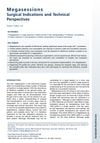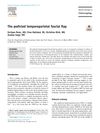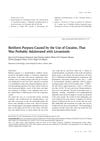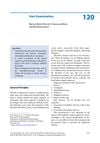 12 citations,
May 1989 in “Postgraduate Medicine”
12 citations,
May 1989 in “Postgraduate Medicine” The document concludes that hair loss is common and can be treated with medications like minoxidil or surgical options, and it significantly affects people's psychological well-being.
 10 citations,
January 2022 in “Scholars international journal of anatomy and physiology”
10 citations,
January 2022 in “Scholars international journal of anatomy and physiology” Aloe Vera gel helps heal skin, treats skin conditions, and can stimulate hair growth due to its various healing properties.
 10 citations,
March 2015 in “PubMed”
10 citations,
March 2015 in “PubMed” Scalp micropigmentation, a cosmetic tattoo technique, is a promising non-surgical treatment for hair and scalp deformities, despite potential complications.
 8 citations,
September 2004 in “Contact dermatitis”
8 citations,
September 2004 in “Contact dermatitis” Avoiding dyed wigs and clothing improved severe allergic reactions in a woman treated with diphencyprone.
 7 citations,
August 2013 in “Facial Plastic Surgery Clinics of North America”
7 citations,
August 2013 in “Facial Plastic Surgery Clinics of North America” Megasessions in hair transplant can cover more area or increase density but need a skilled team and careful planning, and have both benefits like less downtime and risks like lower graft survival.
 4 citations,
November 2020 in “Psoriasis : Targets and Therapy”
4 citations,
November 2020 in “Psoriasis : Targets and Therapy” The document concludes that proper treatment and management of plaque psoriasis in adolescents can improve their quality of life.
 4 citations,
January 2016 in “Postepy Dermatologii I Alergologii”
4 citations,
January 2016 in “Postepy Dermatologii I Alergologii” Many hair diseases, including those caused by medications and psychological issues, can lead to hair loss and require proper treatment and specialist care.
 4 citations,
August 2007 in “Journal of The American Academy of Dermatology”
4 citations,
August 2007 in “Journal of The American Academy of Dermatology” The document discusses a condition causing hair loss after surgery and a type of rosacea affecting the nose, with treatments including surgery and laser therapy.
 3 citations,
November 2018 in “Oncology issues”
3 citations,
November 2018 in “Oncology issues” Cancer survivors often experience worse skin problems from treatment than expected, and working with dermatologists could help improve their condition.
 3 citations,
June 2004 in “Alternative and Complementary Therapies”
3 citations,
June 2004 in “Alternative and Complementary Therapies” The document concludes that hair loss is influenced by genetics and other factors, and while treatments like finasteride can help, they have limitations and side effects.
 3 citations,
January 2021 in “Plastic and Aesthetic Research”
3 citations,
January 2021 in “Plastic and Aesthetic Research” Hair loss reduces hair thickness and coverage, but drug treatments mainly revive dormant hairs rather than reverse thinning; patients often undervalue their hair loss severity.
 2 citations,
March 2021 in “Journal of Cosmetic Dermatology”
2 citations,
March 2021 in “Journal of Cosmetic Dermatology” Umbilical cord-derived media is safe and effective for hair growth.
 2 citations,
October 2015 in “Primary Care: Clinics in Office Practice”
2 citations,
October 2015 in “Primary Care: Clinics in Office Practice” Doctors should diagnose hair loss by examining the patient and possibly doing tests, and then treat it based on the type, which may prevent permanent hair loss.
 2 citations,
June 2019 in “Operative Techniques in Otolaryngology-Head and Neck Surgery”
2 citations,
June 2019 in “Operative Techniques in Otolaryngology-Head and Neck Surgery” The pedicled temporoparietal fascial flap is a reliable and versatile option for reconstructive surgery in the head and neck area.
 2 citations,
August 1987 in “Australasian Journal of Dermatology”
2 citations,
August 1987 in “Australasian Journal of Dermatology” Birth control pills can cause skin issues but may help with acne and hirsutism, and choosing the right type can minimize side effects.
 1 citations,
October 2023 in “Dermatology and therapy”
1 citations,
October 2023 in “Dermatology and therapy” Some treatments for severe hair loss work but often have side effects, with baricitinib showing the most promise.
 1 citations,
January 2015 in “Annals of Dermatology”
1 citations,
January 2015 in “Annals of Dermatology” Cocaine possibly mixed with levamisole caused a woman's skin condition and blood issues, which improved with treatment.
 1 citations,
October 2013 in “Actas Dermo-Sifiliográficas”
1 citations,
October 2013 in “Actas Dermo-Sifiliográficas” Customized medications made through compounding can be beneficial for various skin conditions but require careful regulation and collaboration between doctors and pharmacists.
 1 citations,
October 2013 in “Expert Review of Dermatology”
1 citations,
October 2013 in “Expert Review of Dermatology” Diagnosing alopecia areata is challenging and requires careful examination and various tests to distinguish it from other hair loss types.
 1 citations,
October 2023 in “International journal of Ayurveda and pharma research”
1 citations,
October 2023 in “International journal of Ayurveda and pharma research” Herbal medications might be safer and more effective for hair loss than synthetic treatments.
 November 2024 in “Journal of Clinical Medicine”
November 2024 in “Journal of Clinical Medicine” The treatment improved hair thickness, shine, and reduced hair loss effectively.
 October 2024 in “International Journal of Pharmaceutical Sciences Review and Research”
October 2024 in “International Journal of Pharmaceutical Sciences Review and Research” A 5% minoxidil spray could effectively treat male baldness with fewer side effects and better patient comfort.
 April 2024 in “International Research Journal Of Modernization In Engineering Technology And Science”
April 2024 in “International Research Journal Of Modernization In Engineering Technology And Science” Herbal shampoos are effective, non-toxic alternatives for treating dandruff and hair fall.
Hair proteins in preschool children and their mothers could indicate developmental changes and health status.
 November 2019 in “Harper's Textbook of Pediatric Dermatology”
November 2019 in “Harper's Textbook of Pediatric Dermatology” Understanding normal hair growth and loss in children is key to diagnosing and treating hair disorders.
 July 2018 in “Elsevier eBooks”
July 2018 in “Elsevier eBooks” Frontal Fibrosing Alopecia is a type of hair loss affecting mostly older women, with no agreed best treatment.
May 2016 in “Mayo Clinic proceedings” A gluten-free diet fixed a man's severe stomach pain and bowel issue related to celiac disease, but not much his hair loss.
 January 2015 in “Springer eBooks”
January 2015 in “Springer eBooks” Understanding hair structure and growth is key for diagnosing hair diseases accurately.
 February 2024 in “International journal of biology, pharmacy and allied sciences”
February 2024 in “International journal of biology, pharmacy and allied sciences” Plant-based treatments can effectively and safely treat hair loss.
 November 2023 in “Global Medical Genetics”
November 2023 in “Global Medical Genetics” Netherton syndrome can cause severe dehydration, infections, and growth issues in infants.




























